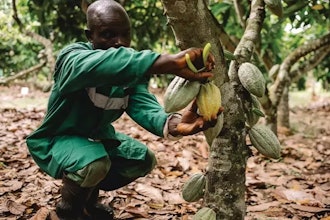ROCOV, Czech Republic (AP) — A drought in central Europe this summer could leave beer drinkers thirsting for their favorite lagers and pilsners: production of the prized hops that give Bohemian-style brews their distinctive flavors are down 30 percent or more in the Czech Republic.
At first glance, nothing appears unusual about the harvest underway in the Zatec region, where hop-growing dates back a millennium. The bitter-tasting Saaz hops that come from there are a key ingredient in Czech beers and sold internationally.
Laborers pull down the vines winding several meters up wires. The rows of greenery form lush tunnels in the fields, but an experienced eye would notice that the flowering cones on the vines are smaller and sparser than desired.
Fritz Josef, who owns 280 hectares (692 acres) of hops, says his yield is down by half this year. High temperatures and scarce rain that started in April persisted through the summer, while August was especially dry.
"The cone won't grow, and actually the whole plant itself goes into shock from the dry weather and from the unnecessary high temperatures," he said.
Josef's hop cones, while underdeveloped, do have adequate bitterness so they can be sold at market. Because he sells his crop at a price fixed years before, he expects to record a loss in 2018, though may be eligible for government subsidies to make up some of it.
Michal Kovarik, secretary of Czech Hop Growers Union, said that despite the "catastrophic" year for farmers, brewers should have enough hops already on hand to keep making beer without affecting consumer prices.
Annual rainfall in the Czech Republic was down 28 percent through the end of July compared to the 30-year average, according to the Czech Hydrometeorological Institute.






















